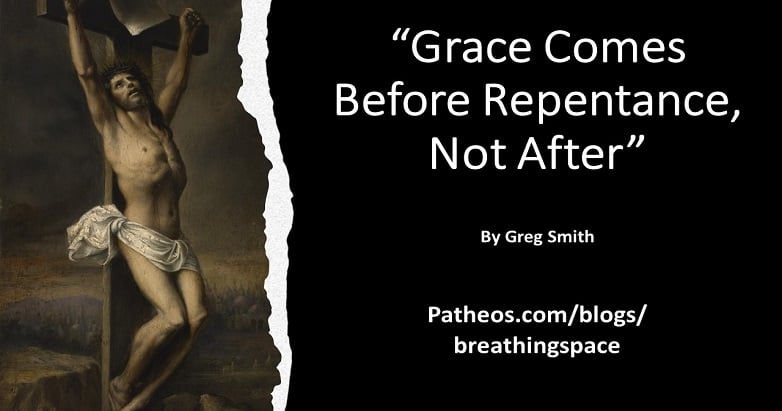Grace comes before repentance, not after. When you finally get this truth, it changes everything. But be warned–it’s a dangerous truth.

Uncomdemning Savior
In John 8, Jesus’ detractors try to back him into a corner by entrapping a woman they have caught in adultery. “Should we stone her, as Moses’ law commands?” they ask. Jesus replies that the one who has never sinned should throw the first stone. In verse 11 (NIV) Jesus says, “Neither do I condemn you…Go now and leave your life of sin.”
Before Jesus tells her to repent (change her ways), he declares grace. First, he refuses to condemn her according to the Law of Moses. Only when she is empowered by this grace, Jesus knows, can she seriously consider a different way of living. This is why grace comes before repentance, not after. Grace is the means of change, not the result of it.
Must We Be Good, to Receive Grace?
Of course, this was not the way we were raised. Most of us who grew up in evangelicalism were taught that first you repent, and then you receive grace. We grew up on the tale of Jonah, who preached God’s judgment to the Ninevites until they put on sackcloth and ashes–and after that God spared them.
First, they repented, and then God relented.
So we were urged to change our ways if we wanted God to save us. And once we “got saved,” we were taught that we’d better keep on the straight and narrow path. Otherwise, Jesus might rapture everybody else but us. They drummed it into our dear little heads that you must be good to receive God’s grace.
But this isn’t what grace is about. The definition of grace is “unmerited favor.” That means Jesus knew the woman didn’t earn her pardon—in fact, according to the law, what she earned was death. Jesus came to demonstrate God’s way of grace, which is superior to the law. That grace forgives, whether we deserve it or not. Then, in the light of our new spiritual reality, God invites us to change.
Grace in the Eyes of the Lord
I grew up hearing the story of Noah, and was told, “Noah found grace in the eyes of the Lord (Genesis 6:11 NKJV).” The very next verse says he “was a just man, perfect in his generations. Noah walked with God.” From this, I gathered that God saw how righteous Noah was, and based on that goodness, God granted him favor. I’m sure you were told this, too–God rescued Noah and his family because they were good. Instead, we see a dysfunctional family that messes up on multiple levels immediately after they’re rescued and make a covenant with God. The fact is that God showed grace first, and after they received grace they made changes (building a boat) that led to their salvation. Then, after they failed, God never gave up on them. God gives grace, not because we’re good, but because God is good.
Grace From the Cross
From the cross, Jesus prayed, “Father, forgive them, for they do not know what they are doing (Luke 23:34 NIV).” Jesus forgave his enemies while they were crucifying him, mocking him, spitting on him, gambling for his garments. Jesus didn’t ask them to change their ways before absolution. He let it all go, without demanding their apology. Now, as a response to that free grace, Jesus hopes we’ll change our lives for the better. But even if we don’t—we’re still forgiven. All of us. Because if he can forgive his murderers, there’s no one outside the grasp of his grace.
A Dangerous Truth?
This is a dangerous truth, I’m told, because it doesn’t take sin seriously. On the contrary, it takes the problem of human transgression so seriously that it understands we’re helpless without grace. Only divine action can create peace.
I’m told this is a dangerous teaching because it risks giving a license to sin. Quite the opposite—this understanding inspires us to do better because God’s positive view of us empowers us to change. Grace enables us to make adjustments to our lives that we never could, without the favor of God.
Grace Before Repentance
The message of Jesus is that grace comes before repentance, not after. Then, strengthened by divine blessing, God gives us the power to improve. Don’t let anyone use fear tactics on you, convincing you that you must earn God’s blessing or maintain your salvation with your own personal righteousness. Salvation is for everyone—not because we could possibly be good enough, but because God is good enough. Anything else misunderstands grace.















